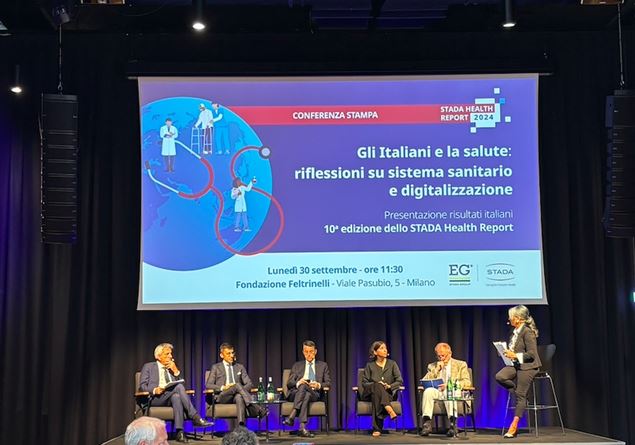
52 percent of Italians do not consider themselves sufficiently protected by the National Health Service (SSN): a dissatisfaction linked mainly to the difficulty of accessing medical visits, but which does not call into question trust in healthcare workers. And although our compatriots are in favor of the digitalisation process that is affecting the medical sector, over 4 out of 10 citizens ask that the relational aspect of healthcare be improved. These, in summary, are some of the elements that emerged from the tenth edition of the STADA Health Report, a survey conducted online by Human8 on behalf of the STADA Group on a sample of 46,000 citizens in 23 countries, including Italy.
In detail, Italians’ satisfaction with the NHS continues to decline, going from 69% in the 2021 edition of the STADA Health Report to 48% this year. For the majority of those interviewed (70%), the main cause of this negative trend is attributable to the difficulty of obtaining an appointment to carry out a medical examination, while 31% of the sample complains about inadequate standards of care and 20% cites the lack of access to prevention servicesespecially in the regions of Southern Italy. Among the guests at the presentation of the report is Dr. Claudio Cricelli, President emeritus of the Italian Society of General Medicine and Primary Care (Simg), who starts from the research data to give a judgment on the damage of differentiated autonomy: «The The health service’s problem is access and this varies too much from region to region. Fragmentation lately can only worsen the situation, aggravated by the lack of over 3,100 general practitioners, with more critical situations in the large Northern regions”. In the crosshairs of criticism from Italians, access to treatment but also local healthcare: «In small villages and inland areas there are municipalities with pharmacies 20 km away which make it difficult for pharmacists to be the first bastion of prevention», underlines Giovanni Petrosillo, vice president of Federfarma. And it is precisely on the topic of prevention that another worrying figure is recorded, according to the research: almost 6 out of 10 Italians (59%) do not undergo screening and checks, still revealing a lack of sensitivity on the topic, as already emerged in last year’s edition.
As the level of dissatisfaction with the NHS increases, according to the report, the trust that Italians have in conventional medicine does not decrease – higher than the European average (77% vs 69%) – recognizing the competence of doctors and pharmacists as one of the main factors of reliability. «It is the positive side of a situation that remains critical in many aspects», comments Annalisa Mandorino, general secretary of Cittadinanzattiva non-profit organization «despite everything, Italians believe in the NHS, they know that public health is the most important antidote we have against inequalities. They are not resigned to losing this service.”
Another chapter touched upon by the research concerns the relationship between health and digital: over 80% of the sample uses digital platforms or internet sources to retrieve information on health matters, primarily “Doctor Google” (59%)followed by online articles (35%), websites of healthcare institutions or pharmaceutical companies (19%) or influencers (17%). The data regarding the use of Artificial Intelligence to support healthcare workers is interesting: 31% of Italians are in favor of the use and increase of this technology in hospitals. In general, Italy is in favor of an increase in digitalisation – from electronic medical records (60%), to electronic information leaflets (41%), to apps (35%) – in the healthcare field, but with the aim of supporting and increase the human and relational component of assistance (over 40%) which must never be missing. Such as a holistic approach to care (36%), which takes into account both the patient’s physical and mental health.
And this is precisely the third and final major theme on which the STADA Health Report 2024 focused. Over 1 in 2 Italians (57%) suffer from loneliness (compared to 52% of Europeans) and 20% from burnout: problems that mainly affect women and those under 35. Young people are also those who complain most about the impact that loneliness has on their quality of life. «Loneliness is certified by the high consumption of specific drugs, increasing year after year» admits Andrea Mandelli, president of the Federation of Italian Pharmacists’ Associations (FOFI). “We have a collaboration in the works with the Order of Psychologists to understand how to interact together and direct patient orientation.”
Among the proposals put forward by the editors of the report to alleviate this state of malaisethere is a better balance between private life and work, especially for the younger segments of the population. While demanding greater changes in society and the business world, such as economic improvements, women. Finally, elderly people would need “after-work” support and access to leisure facilities.
«We are thrilled to have collaborated again this year with the STADA Group for the creation of the new edition of the Health Report, which has allowed us to outline a picture of the opinion of Italians regarding macro issues of health and healthcare», declares the curator Elena Madonia, Research Manager of Human8. «The results that emerged are of great importance: the negative trend continues regarding the degree of citizen satisfaction with the healthcare system, confirming above all difficulties in accessing medical visits. Nonetheless, Italians continue to place their trust in conventional medicine and healthcare professionals. However, as regards the topic of ‘mental health’, women and younger people are the categories that suffer most from loneliness and episodes of burnout.”
The STADA Health Report «continues to be a precious tool that allows us to obtain a clear and in-depth vision of the challenges and opportunities of our NHS, offering interesting insights into the main concerns and needs of Italians in the healthcare sector!, concludes Salvatore Butti, General Manager & Managing Director of EG STADA Group. «The results provide data and reflections that can stimulate a constructive discussion in order to work together towards a single objective, a more accessible and innovative future of health. Furthermore, the Report shows how Italians are increasingly asking for a ‘patient care’ approach, which highlights the human side of healthcare, underlining the need to enhance the relational aspect of care. An element which, in an increasingly digitalized context, turns out to be an essential pillar to guarantee the overall well-being of people.”







